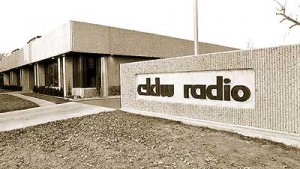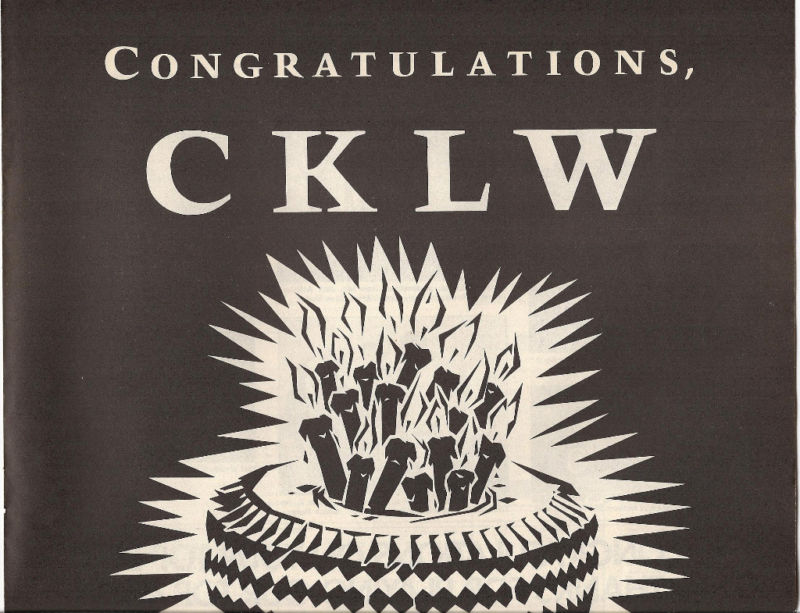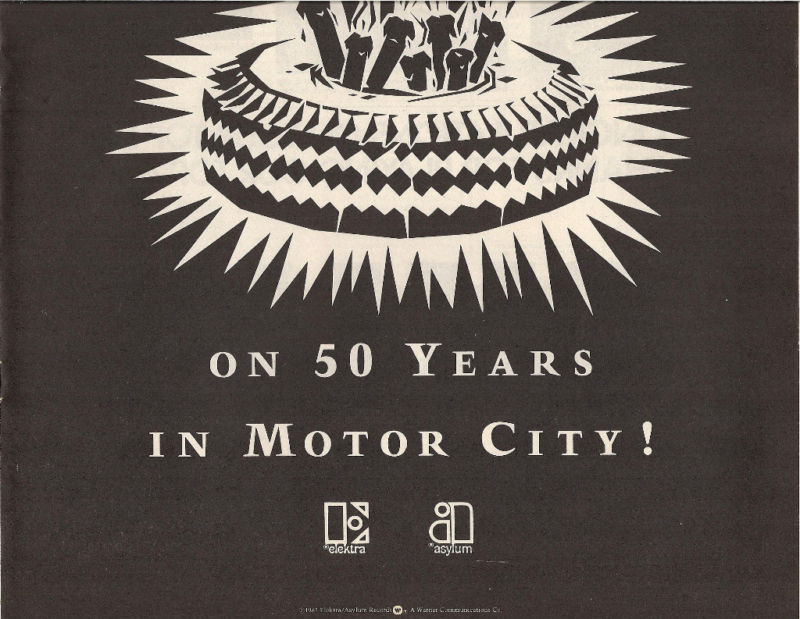TODAY’S NEW BUSINESS: INCREASING MARKET SHARE WHILE SPANNING TWO COUNTRIES AT THE BIG 8
DETROIT / WINDSOR — “Radio is a business first, everything else second,” says CKLW president Chuck Camroux. A wholly-owned subsidiary of Baton Broadcasting since 1970, CKLW-AM and CKJY-FM span the U.S.-Canada border, enjoying a double-market enterprise but also above normal expenses.
“Ninety-nine percent of all stations operate from one building. We operate from two and they’re 20 miles apart in two different countries. The complications are unique,” Camroux continues.
It was Camroux’s interest in “unique” CKLW which brought him from a consulting business to the CEO’s office at the station three years ago. “Most people think of me as a straight businessman,” he says, “but my career was made as a rock program director. Now, it’s essential to focus the attention on being a business. It’s a necessity when you’re dealing with millions of dollars in a major competitive radio market.”
 Most AM-FM combinations divide their staff along format lines. At CKLW, the organization almost seems to have four faces, Camroux says. Even with a four-way division of labor (AM/Canada, AM Detroit, FM Canada, FM Detroit) there is little duplication of staff. “The only separate department is programming,” Camroux says.”AM and FM share news, traffic, engineering, accounting, sales and promotions.”
Most AM-FM combinations divide their staff along format lines. At CKLW, the organization almost seems to have four faces, Camroux says. Even with a four-way division of labor (AM/Canada, AM Detroit, FM Canada, FM Detroit) there is little duplication of staff. “The only separate department is programming,” Camroux says.”AM and FM share news, traffic, engineering, accounting, sales and promotions.”
It’s the other axis that causes the headaches. “We need international telephone lines and mail couriers. Scheduling can really be a problem. If there’s a sales meeting for the U.S. sales department, either all the salesmen have to drive for an hour, or I do. The day can get really chopped up,” he says.
Operational hangups are only part of the problem. Stringent Canadian government regulations, declining profits and audience fragmentation have made CKLW’s going pretty rough.
“In the U.S., even forgotten deregulation, the FCC is concerned with legalities and technical questions,” Camroux relates. “”In Canada, CRTC controls programming. A separate handles the technical end. Regulations are strict on programming. The well-known Canadian content requirements are only a small part. There are broad rules on repetition — 18 times a week is the maximum for any FM format. On easy listening stations, the repeat factor is only once or twice weekly. Formats are strictly defined. For example, any song with a sustained beat and electronic accoutrement is in a rock category. If a station makes more than 10% variation on promised performance (as described when the format is assigned) it’s considered a format change. Canadian program directors are half typical program directors and half statistician.”

For management, this means tremendous amount of government liaison. Camroux has testified at both U.S. senate hearings and its Canadian Parliament counterpart. It costs more to operate (a radio station) in Canada than in the United States, Camroux claims. On the average, staff must be larger. There is more paperwork and file processing involved. Logs must be filed every Monday. There are fewer stations and all are full-time. In Toronto (population 3 million) there are 17 stations, five non-commercial. In Detroit (population 4 million) there are 54 stations.
Camroux feels stations have a better chance of survival in Canada. “Ad ratesin Canada are pretty close in the same market, while in the U.S., tremendous swings are possible,” he says.
“Wheeling and dealing is standard in the U. S. but not in Canada, although the soft economy is changing that a bit,” he adds. Different AM rate cards apply in the two countries, although Camroux points out the per point rate is the same. FM rates are standardized.
CKLW has lost substantial amounts in the past two years, according to Camroux. When RKO owned the radio station, it was very profitable. Since 1971, profits have been on a decline. Camroux sees two main forces acting to create the earnings drop. “Market fragmentation (the market didn’t grow fast enough for the growth in stations) and decreasing ratings for CKLW (in part due to Canadian content requirements) caused revenues to decrease at the same time expenses increased,” he comments. “When the great crash of 1980 hit Detroit, it hit us too. Compared to 10 years ago, our dollar share of the market is much smaller, though actual revenues are up. Adjusted for inflation, they are down. Expenses have increased much more, but given a positive economy, profits will come back,” he concludes optimistically.
“Another factor was FM eating AM profits,” he says. “In 1979, we decided to change from a country format to big band, Now that the change is accomplished, we feel FM will be profitable by the end of the year. (CKLW-FM became CKJY-FM ‘unforgettable’ on January 14, 1982). We’ve cut costs there — the station is automated now — but as the station grows, we want to become live again, except possibly at night.”
Since February 1, CKJY-FM has spent nearly a quarter million dollars on promotion, including a Benny Goodman video. ‘We’re using television spots designed specifically for the U. S. and Canada,” Camroux reports, “and print ads in special areas.
“In Canada, we used an outdoor campaign. In Windsor, every bus side and back had our promo and we sent an 80,000 piece four-color mailing to every household.”
The response to the format change has been overwhelming, Camroux says. “We’ve gotten hundreds and hundreds of letters from listeners. We got four letters a year when we were country. Since the switch, we get about 200 a day, every one answered. We’ve had offers of old records, record libraries. The most surprising response has been from 25 to 35-year olds, although they’re still the smallest segment of our listeners.
“For AM promos, we’re up in the high echelon of dollars spent. On the air promotion is much less aggressive than a few years ago.” Canadian regulations prohibit more than $5,000 in mechanism of cash giveaways in a month.
Camroux believes in long term planning. “It’s difficult because radio is different than most industries. The product (programming) can’t be planned, therefore the tendency is to avoid long term planning completely — one year ahead is about the longest at CKLW. We budget for a year with a five year future focus, aligned in one direction. Despite the difficulties, it has to be done, because it’s important for the staff to know what’s happening.”
One aid to long-range planning has been staff longevity. “Some of our disk jockeys have 15 years on the air, some of the support staff 20 years. Our chief engineer has been with the station for 10 years.” END.
(Information and news source: Billboard; August 7, 1982).
![]()


